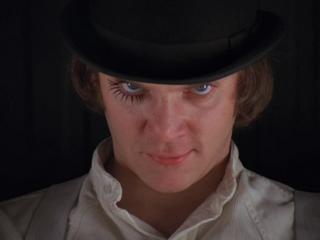A Clockwork Orange is one of those unique films that is often very polarizing, though more in that a select group of people hate it instead of the traditional 50-50 split. I can see the reasons for hating it, some simply don't like Kubrick's style of film-making, which is certainly unique to him and different than any other director really, some believe the ultra-violence is simply too gratuitous, and it caused quite a stir when first released, and others believe it simply attempts beyond its scope, deals with issues in passing which need entire films dedicated to them. While I agree on most points I believe that A Clockwork Orange is one of the defining films of the 70's, and the best damn interpretation that Burgess could hope to get.
Onto the film. It begins incredibly aggressively, with an intensely red film proclaiming the title and the director and shouting at the audience that this is not a passive film, not a subtle film, and not a pleasant film, a real good opener strengthened by the lack of opening credits, just a straight open onto the Kubrick stare of the protagonist who I'm sure most people have seen, as it is one of the most parodied scenes from the film, possibly because it is the least lude. The end is the same thing, with shocking almost blood red immediately after the end line. This establishes the tone and sets the pace and is really beautiful in its simplicity.
Moving on we see the droogs, one of the many made up terms used throughout the film, up to a good bit of ultra-violence, as they beat and nearly kill a drunk homeless man, following up this wondrous event they have a good old scrap with another gang, leaving their opponents nearly dead from blood loss. This is of course followed up by the good old rape and cripple, as they enter a house dressed in strange masks and Alex, our 'protagonist' for lack of a better word hums to singing in the rain during his rape. Now the only reason he did hum this, was because it was the only thing that actor knew, though it does lend some irony and additional grimness to the scene.
 |
| Quite a Contrast |
Now how he is betrayed by the system is interesting, because of the way it is presented. Society wants him to be good, that is what the social worker and his parents and the prison system all seek, but there are some, like the lead guard in the film who believe otherwise, and the message of the film relates to this. Alex's reform is the crux of the second act of the film, and the event that drives the third act. Alex is reformed through the use of subliminal messaging to tell him that violence and sex are bad, repeated through incredibly aggressive imagery to Beethoven's 9th, a beautiful piece of music.
The film delights in the irony of it and the fact that by depriving this villain Alex of all violence they have made him as innocent and defenseless as a lamb unknowingly drifting off to the slaughter. Everything that he had done to the people before is revisited upon him, and eventually it becomes too much. He is tortured by his previous lover, the music of Beethoven, quite possibly the only thing he ever loved as well given his attraction to sex but not to a relationship.
 |
| The infamous device |
The theme of powerlessness is always an interesting one in fiction, and dealt with fairly thoroughly in this, though it deals more with power than the lack of it. His droogs become policemen and thus have corrupting power and the ability to control him in his weakened state. His control over them previously was through the threat of violence and actually carrying it out when he believed they needed to be kept in line. Given that is dystopian fiction the overall rulers are also important and corrupt, caring more about winning the next election than anything else, which drives the events with Alex. They believe that an untested treatment may give them an advantage on crime, so immediately use it, and when it fails use it again for the PR boost. It's no different than what most politicians do nowadays however, so carries that perpetual message.
What makes it so effective is the ugliness of the film. Much in the same way as Chainsaw Massacre, the film is not pretty, all nudity is uncomfortable and ugly, and even the theoretically perfect society deals with criminals in a grotesque way, altering their minds to try to prevent crime, maybe even thought-crime going to everyone's favorite dystopian novel. I will say now that it is an effective film in what it seeks to do, to unnerve and to show a terrifying direction the future may go in, just like all dystopian fiction. Give it a watch, but be prepared for the ugliness inherent in the story, and a view on the darker side of humanity.


Greetings. I have created a semi-functional clockwork orange (a tangerine of some sort, truth be told...) Send me an email address and I'll send you an image. Regards. Angelo Pastormerlo angelo.pastormerlo@gmail.com
ReplyDeletefrom a quick browse-through you seem to provide a rather interesting analysis of the film (which i still have yet to watch, though i've read the book in its entirety). but mostly, what caught my attention was the simplistic yet very cool vector illustration of the titular "clockwork orange" that adorns the top of this blog. kudos to the artist!
ReplyDelete...and now onto more reading... >[:)